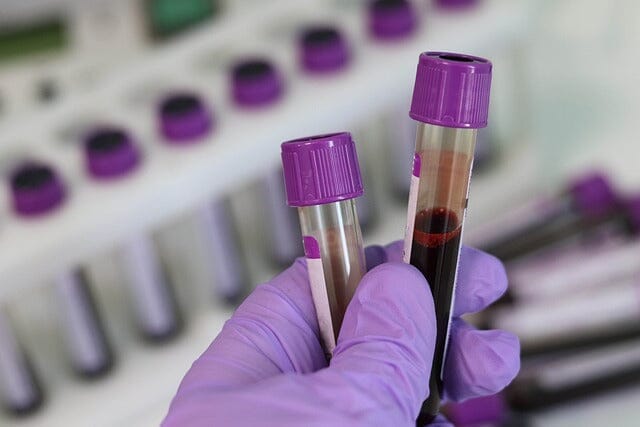
Why get a creatinine test? What's the serum creatinine normal range?
Time to read 5 min
Time to read 5 min
With creatinine being a waste product generated as a part of the energy production process, it is a great test to determine whether your kidneys are working effectively. The serum creatinine normal range can provide insights on whether the kidneys are functioning optimally through different stages.
The test is also important to perform to determine the progression of kidney disease in the body. With the progression of the disease, the levels of creatinine rises in the blood as the kidneys are unable to filter them out effectively. Doctors can perform further testing based on the results of the creatinine tests.
If the kidneys are impaired or damaged for a range of reasons, the levels of creatinine will start to rise in the blood. The filtration of creatinine in the body will be ineffective, leading to high creatinine levels above 1.4 mg dl. Therefore, a creatinine blood test is a critical parameter that doctors use to measure kidney function.
If the levels of creatinine in the blood are abnormally high, then this would indicate that the kidneys are unable to function properly as a part of the energy production process. The level of creatinine in your blood will determine how well your kidneys are working over time. The serum creatinine level may be used to track chronic kidney disease as well.
It's important to know the specific normal range for men and women when it comes to creatinine levels. This can help doctors perform diagnostics tests to determine if your kidneys are performing as they should be.
Both high and low creatinine levels should be a cause for concern, which is why a normal range of blood creatinine levels are tracked for men and women. The levels are also determined by the size and muscle mass present in the body.
For adult men, the normal range for creatinine levels is 0.7–1.2 mg/dL.
For adult women, the normal range for creatinine levels is 0.5–1.0 mg/dL.
When there are higher levels of creatinine in the blood then there is significant kidney impairment which can lead to complete kidney failure. In the case of low creatinine levels, doctors can diagnose severe weight loss, malnutrition, chronic illnesses, and lower muscle mass.
Muscle mass wastage can also be determined when there are low creatinine levels in the body. Older people may be more prone to lower creatinine levels over time, if they are not taken care of effectively. You can develop chronic weakness and joint health risk factors over time.
There are several core reasons why doctors would recommend you getting a creatinine test performed.
A screening test for potential kidney disease is the creatinine test. You can review your risk of developing kidney function failure and disease with the creatinine test.
If you already have diabetes, high BP, and other critical conditions that can enhance your risk of kidney disease, then this test is recommended. You should take the test regularly when you are managing a chronic illness.
When you are on medication for a medical condition, then you should check if your kidneys are being impacted by the drug. Altered or diminished kidney function can lead to a range of issues, which is why testing is key.
If you are undergoing kidney treatment or are tracking disease progression, then the creatinine test is key again. Doctors can reference the creatinine levels in the test to track the recovery of the kidneys.
When you undergo a kidney transplant, your serum creatinine levels can be checked to see if your new kidneys are functioning normally.
At a serum creatinine level of 2 mg/dL for adults, the kidneys are termed to be severely impaired. Dialysis is required to remove waste from the blood, when there is significant kidney failure present in the body.
There are several important symptoms of kidney disease that you should be mindful of, especially if you are already managing another medical condition.
If you find that you are experiencing feelings of nausea and are vomiting frequently, then you should get tested for kidney function immediately.
A loss of appetite is one of the main initial symptoms of kidney disease, especially if you are already malnourished.
If you find yourself needing to pee more or less often than usual, then there may be an issue with kidney function involved. You should get a kidney function test done immediately.
If you feel tired all the time, and are bedridden on some days, then you should get a complete kidney function test performed. This can help you get clarity on your kidney function problems.
If you are having problems with quality of sleep, and are waking up tired all the time, then it is best to get checked for serum creatinine levels. There could be a problem with your kidneys that is causing this problem.
If you are prone to getting cramps in your body, even without physical exertion, then you should get tested for kidney issues.
If you feel like you constantly have dry skin and you need to scratch at your knees and legs, then you may have kidney issues. The symptom could escalate further.
If you are experiencing hypertension high blood pressure symptoms, then you should get your kidney checked as well. Elevated serum creatinine levels could be behind the issue.
If there is fluid building up in the lungs, then there could be a symptom of breathlessness. This could occur even when sitting normally, which is why it is a critical sign of kidney problems.
You can experience shooting chest pain as well, as a core symptom of fluid building up. You should get tested for serum creatinine levels in the body immediately.
You can focus on a range of diet, lifestyle, and other factors to help improve your kidney function. These strategies can help in enhancing your overall kidney output as well.
What's important is to limit your intake of processed foods, and to cook with a variety of vegetables. You should also focus on consuming salads and soups to boost your intake of vitamins and minerals.
You can also boost your kidney health by focusing on your key deficiencies. You can get regularly blood tested for a range of markers, and keep a close track on your body's imbalances across various organs and functions.
Focusing on your fitness goals will help in improving overall kidney functions. By aiming for 4-5 hours of exercising a week, you can improve your muscle mass and lower your risk of developing kidney disease.
If you are under medication for specific conditions such as diabetes, high blood pressure, etc. then tracking their impact on your kidneys can help. You can get tested regularly and track your symptoms closely.




